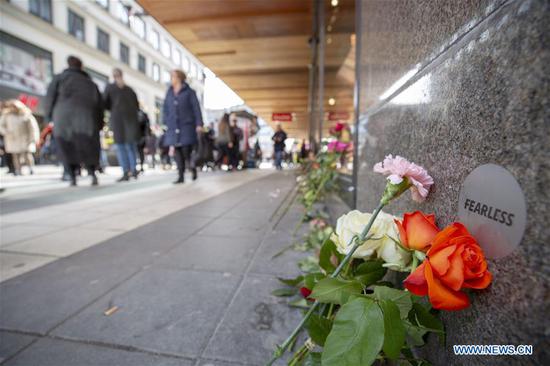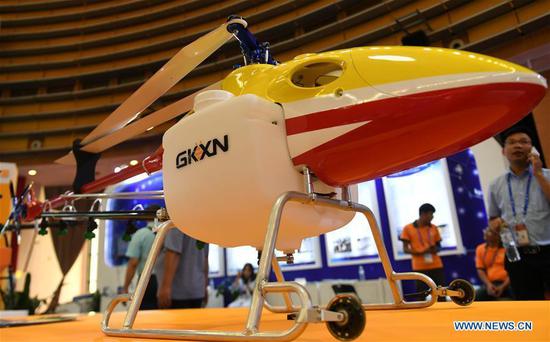
Flowers are laid in memory of the victims of last year's truck attack, in Stockholm, Sweden, on April 7, 2018. (Photo/Xinhua)
The results of the Swedish general elections earlier this week eventually brought relief to the many who were closely following the political news in the Nordic country: the far-right Sweden Democrats did not win as many seats in the Riksdag as anticipated.
Nevertheless, the party still gained ground, in a worrying trend previously seen in Germany, yet another country once welcoming refugees. It is a potential kingmaker in the negotiations to form the next government.
The party won 18.2 percent of the votes in this year's elections, while neither the center-left or the center-right major parties won an absolute majority, according to official preliminary results on Thursday.
The votes clinched by the Sweden Democrats represent a substantial increase from the 12.9 percent it won in 2014 and 5.7 percent in 2010, respectively.
Mikael Sundstrom, a political scientist at Lund University, told Swedish Television after the elections that he believed the Sweden Democrats rode on back of bad news about immigration and that the party had increased its strength and has the potential to gain more support in southern Sweden.
"(They) tend to blame foreigners, no matter (if) it's true or not," he said. "It's populist mentality."
IMMIGRATION BACKLASH
When voters headed to the polls on Sunday to pick their new legislature and, with it, a prime minister, some people worried that the elections may produce an "unpredictable result," largely because of the Sweden Democrats.
Formed in the late 1980s by individuals with links to the neo-Nazi movement, the Sweden Democrats was affiliated with the Alliance for Direct Democracy in Europe, a European organization of right-wing populist parties including the Alternative for Germany (AfD) and the UK Independence Party. The Sweden Democrats had been running on a platform of Euroskepticism and overhauling the immigration system.
Sweden registered a record-breaking 163,000 asylum seekers in 2015 while Germany recorded 745,545 asylum applications in 2016.
The far-right political forces have exploited the social challenges resulting from the immigration inflow to gather support. Stories, pictures and videos widely circulated on social media played a role, too.
The far-right political parties grew at an astonishing rate.
Today, far-right protesters can still be spotted chasing down foreigners in German cities, while far-right groups held "strike back" banner-demonstrations in the streets of Stockholm, the Swedish capital.
In the riots in Stockholm in May 2013, hundreds of immigrant youths violently clashed with police, torching cars while leaving several injured.
In 2017, Uzbek jihadist Rakhmat Akilov, who was denied asylum and went underground, pleaded guilty to the truck ramming incident which killed five people in Stockholm. He had claimed allegiance to the Islamic State prior to the attack.
This year, just before the elections, several locations in West Sweden saw immigrant youth riots. More than 100 cars were set ablaze.
This is in addition to gang-related gun murders and other crimes committed by male immigrants. The police had identified 23 "especially vulnerable areas" plagued by such social issues and crime.
"We can't blame immigrants in our society simply because the integration (programs) didn't work. The solution is to create employment, provide opportunities and integration, making them useful assets to society," Niklas Swanstrom, director of the Institute for Security and Development in Sweden, said in an interview with Xinhua.
"In the meantime, the immigrants should accept Swedish values of democracy, openness, and liberty, and actively integrate," he said.


















































